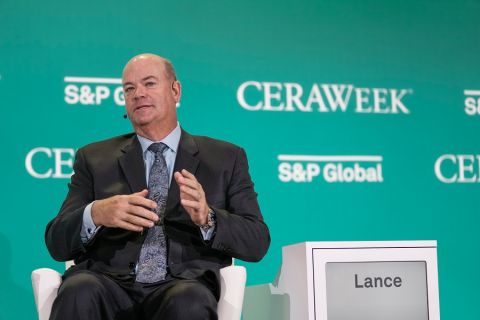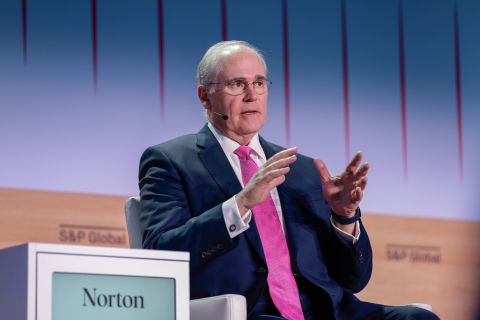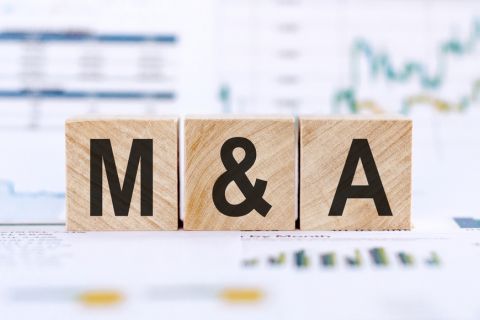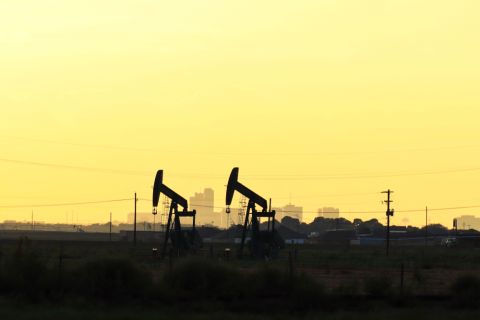Norway's Equinor ASA wrote off $2.93 billion from the value of its assets after cutting its long-term oil and gas price forecasts on Oct. 29, betting the pandemic and a shift away from fossil fuels will have a lasting impact on markets.
The biggest hit came from a $1.38 billion write-off in the U.S., most of it from the company's loss-making onshore shale oil and gas business, pushing Equinor to a net loss of $2.12 billion in the third quarter.
The energy major's adjusted profit before interest and tax (EBIT) fell 70% year on year to $780 million, lagging the $1.03 billion predicted in a poll of 24 analysts compiled by Equinor.
"Our financial results are impacted by weak prices as regions across the world are still severely affected by the pandemic," outgoing CEO Eldar Saetre said in a statement.
The company, which is majority owned by the state, raised its dividend to $0.11 per share from $0.09 per share, still well below the $0.27 paid for the fourth quarter of 2019.
Equinor remains committed to resuming the $5 billion share buyback program that was postponed earlier this year once conditions allow, said finance chief Lars Christian Bacher.
The asset write-offs follow similar decisions by BP Plc, Royal Dutch Shell Plc and other oil companies that have wiped tens of billions of dollars off their book values this year.
The biggest write-downs stem from Equinor's assets in the Bakken shale field in the U.S. and the Mariner heavy oil field off the coast of Britain, the company said on an analysts call without elaborating.
Oil Price Outlook
Equinor said it expects the price of the Brent crude benchmark to average $64 a barrel for the 2021-2050 period, higher than the $55 predicted by BP in June and also above Shell's long-term price forecast of $60 from 2023.
Equinor's expectation for Brent was set to $65 a barrel for 2025, down from $78 previously.
It also lowered its gas price outlook, forecasting British gas prices at $6.50/MMBtu, or 50.26 pence per therm in 2030, down from $7.7/MMBtu previously.
"Significant uncertainty remains around the future commodity price development, underlining the importance of increased competitiveness and financial resilience," said Saetre, who said in August that he would retire at the end of October.
Brent crude was trading down 4.6% at $37.30/bbl on Oct. 29, pressured by renewed coronavirus lockdowns, while the British day-ahead gas price was down 0.8% at about 38 pence per therm ($4.90 MMBtu).
Equinor's shares were down 1.8% by 12:18 GMT and have lost 32.5% this year, outperforming an average 47% drop in European oil and gas stocks.
Recommended Reading
Analysts: Diamondback-Endeavor Deal Creates New Permian Super Independent
2024-02-12 - The tie-up between Diamondback Energy and Endeavor Energy—two of the Permian’s top oil producers—is expected to create a new “super-independent” E&P with a market value north of $50 billion.
ConocoPhillips CEO Ryan Lance: Upstream M&A Wave ‘Not Done’ Yet
2024-03-19 - Dealmaking in the upstream oil and gas industry totaled $234 billion in 2023. The trend shows no signs of slowing, ConocoPhillips CEO Ryan Lance said at the CERAWeek by S&P Global conference.
ONEOK CEO: ‘Huge Competitive Advantage’ to Upping Permian NGL Capacity
2024-03-27 - ONEOK is getting deeper into refined products and adding new crude pipelines through an $18.8 billion acquisition of Magellan Midstream. But the Tulsa company aims to capitalize on NGL output growth with expansion projects in the Permian and Rockies.
EIA: E&P Dealmaking Activity Soars to $234 Billion in ‘23
2024-03-19 - Oil and gas E&Ps spent a collective $234 billion on corporate M&A and asset acquisitions in 2023, the most in more than a decade, the U.S. Energy Information Administration reported.
Dallas Fed Energy Survey: Permian Basin Breakeven Costs Moving Up
2024-03-28 - Breakeven costs in America’s hottest oil play continue to rise, but crude producers are still making money, according to the first-quarter Dallas Fed Energy Survey. The situation is more dire for natural gas producers.





